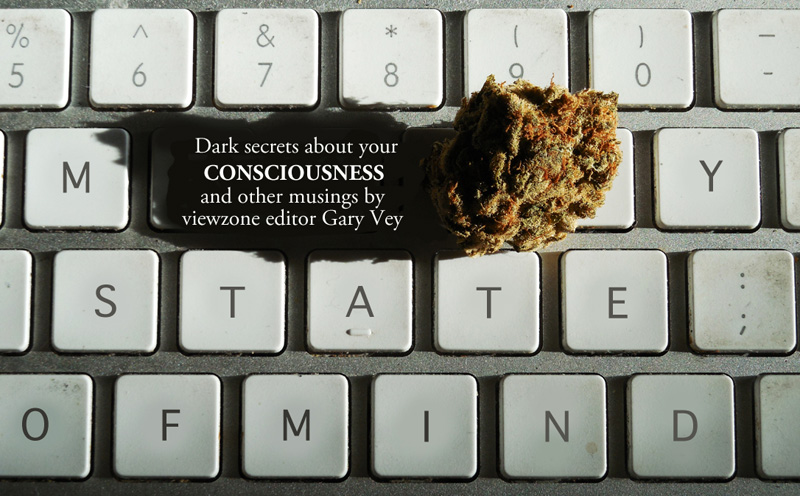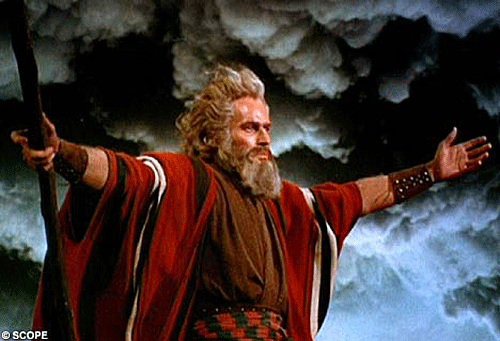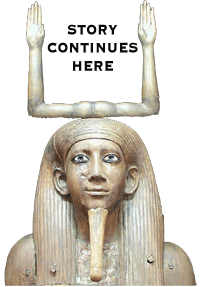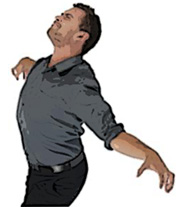
In Genesis, for example, the first and second chapters tell different creation stories; the story of the flood is a monotheistic rewrite of the Sumerian inscriptions...
It has all begun with the discovery of the manuscript of Deuteronomy in Jerusalem in 621 BCE by King Josiah... and Hebrew history, like a nomad staggering into a huge inheritance, put on these rich clothes, some not its own, and belted it all together with some imaginative ancestry. It is thus a question whether the use of this variegated material as evidence for any theory of mind whatsoever is even permissible."
Jacob the deceiver
Sometime in the middle of the second millennium, before the birth of Moses, Abraham's descendants give birth to two sons, twins, named Jacob and Essau. Surely this entire family had the advantage of consciousness as evidenced by their saga of lies, deception and heartbreak (exhibiting Theory of Mind ability).
It is Jacob who steals his father's blessing and inheritance by impersonating his brother at their father's death bed. Deception seems to be endemic with Jacob, his wife (who switches brides on Jacob and later steals a valuable idol from her own family) and even his god, who wrestles with him anonymously.
I think it would be a good idea to look at some of this immoral and dishonest behavior of Jacob [link] -- all sanctioned by the same tribal "voice" who commanded Abraham. It is Jacob who later changes his name to Israel.
Now things really begin to get interesting.
Moses: Yahweh takes control
The second millennium BCE was a time of unprecedented destruction and social upheaval. The violent expansion of the Assyrian Empire as well as the eruption of the Thera (Santorini) volcano destroyed an entire civilization (Minoan) and caused mass migrations of refugees from surrounding regions whose land was covered by the thick pumice and ash.
 As the traditional gods of the people seemed indifferent or even angry to allow these calamities, it was assumed that they were punishing men because of their lack of worship. This was particularly true of the gods that controlled weather or crops. These gods were to be avoided, lest one trigger their anger and suffer the consequences. A kind of evil divinity, a demon, was taking shape in the minds of bicameral man.
As the traditional gods of the people seemed indifferent or even angry to allow these calamities, it was assumed that they were punishing men because of their lack of worship. This was particularly true of the gods that controlled weather or crops. These gods were to be avoided, lest one trigger their anger and suffer the consequences. A kind of evil divinity, a demon, was taking shape in the minds of bicameral man.
While there was a national god, the many conquered people had not forgotten their family and tribal gods. Small shrines were found in excavated dwellings that confirm this. Often these lesser gods were asked to send votive messages to the chief gods on their behalf, or to appease an "evil deity" that they dared not approach. When this was successful these lesser but helpful "good" divinities were the basis of angels.
By about 1500 BCE some intelligent and literate descendants of Abraham were perpetuating the same tribal voice called Yahweh. One of these is the individual upon whose life the Biblical character, Moses, was based.
From his character development in the Bible we see that Moses was very much a man of consciousness. Much of his life story has been "borrowed" and edited. We're not sure even if he was entirely real... but let's assume he was.
The date of about 1500 BCE approximates the eruption of Thera, the most powerful explosion in recorded history. Many scientists believe the seven plagues as well as the parting of the sea can be attributed to the fallout and environmental changes including a large tsunami.
I will assume you all know the story of Moses. He was an official (sometimes called a "prince") of the Pharaoh in Egypt at a time when the Hebrews (descendants of Abraham) were being held as slaves. Knowing his own heritage, Moses became angry when he saw a slave owner mistreating a Hebrew slave and killed the man. He then fled to the desert for fear of being caught.
In the desert, Moses first saw a bright light and then heard the voice of Yahweh, who commanded him to return to Egypt and free the Hebrew people. Rather than immediately obey the hallucinated voice, Moses argued about his ability to do this, saying he was not a good public speaker and it would be too difficult a task.
Arguments and second guessing the voice of Yahweh are characteristic of the Moses story, however much of it is historically true. This suggests that Moses was a bit suspicious about the motives and direction of Yahweh. In the end, Yahweh reminds him of this habit of doubting and punishes him.
Moses is responsible for the Ten Commandments which, like the Laws of Hammurabi, would become the bicameral voice for the people who had not yet evolved consciousness. These were "written" laws, however, and unlike the hallucinated bicameral voice, man could "look away" from them and ignore them. This was the seed of the breakdown of the bicameral mind and the birth of consciousness.
Although the interactions with Yahweh were not obviously painful or interfering with the physical condition of Moses, most other encounters with the Yahweh ("He-that-is") voice were not so fortunate. Something unusual began to happen with subsequent communication with this voice of Abraham's tribe -- this Yahweh. Now he began to not only talk to people but to get inside of them and possess them!
Possession vs Bicameral Voice
In the bicameral voice, the Right Hemisphere's Wernicke's Area (language center) completely controls the audio hallucination, whose content is the product of Right Hemisphere observation and thinking. This is where the god resides. In the Trance Possession state, the Right Hemisphere's Wernicke's area (language production center) controls the Left Hemisphere's Brocha's area (language comprehension center). The content is from the god in the Right Hemisphere but it produces speech through normal channels in the Left Hemisphere. This is often accompanied by physical contortions as the Right Hemisphere also tries to seize control of the motor functions from the Left dominant brain. In normal consciousness, the Left Wernicke's Area controls the Left Brocha's Area to create and understand language and use it as the narrative of reality. The Right Hemisphere's language areas are apparently not involved.
|
How does Yahweh talk to conscious men?
In the 1980s, an academic group studied the Old Testament prophets to determine the nature and origin of their communication with Yah (Yahweh, Jehovah), their Hebrew deity. They were especially interested in the many references to a Possession Trance State that accompanied the communication.
Possession Trance: "...a condition in which a person is believed to be inhabited by the spirit of a supernatural being... characterized by acting like the inhabitating spirit, lapsing into a coma-like state; speaking unintelligibly, exhibiting physical symptoms such as twitching, wild dancing, frothing at the mouth, and so on.Possession trance may be an individual or a group phenomenon. It may be induced by drugs, music, or other methods external to the individual, or it may be a spontaneous manifestation by the person possessed. It may be a phenomenon restricted to a particular status or role (i.e. diviner, medium or priest) or it may occur at random in the society.
In all cases, however, the phenomenon is accepted within the society as a trance induced by a spirit entering the person possessed, and not as an individual psychological aberration."
The group was surprised to learn that the Biblical translations from Hebrew to Greek and English had misinterpreted words such as "prophet" and "prophecy" when, in fact, they referred to "being in a trance state." There was no intended reference to prophecy at all.

"YAH talkin' to me?"
The "trance" of YAH was not a natural or pleasant phenomenon. It was usually experienced in a group context, induced by music (Right Hemisphere), and produced grotesque contortions, a painful expression ("as if one had just learned bad news." Is. 13:7-8; Hab. 3:16; Ezek. 21:11-12) and, for some reason, the urge to disrobe.
"Therefore all hands will fall limp,
And every man's heart will melt. They will be terrified,
Pains and anguish will take hold of them;
They will writhe like a woman in labor,
They will look at one another in astonishment,
Their faces aflame." --Isaiah 13:7-8
"I heard and my heart pounded,
my lips quivered at the sound;
decay crept into my bones,
and my legs trembled.
Yet I will wait patiently for the day of calamity
to come on the nation invading us." --Habakuk 3:16
"And when they ask you, 'Why are you groaning?' you shall say, 'Because of the news that is coming. Every heart will melt and every hand go limp; every spirit will become faint and every knee become as weak as water.' It is coming! It will surely take place, declares the Sovereign LORD."
--Ezekial 21:11-12
Some have described Transe Possession as an "animal" state.
EXAMPLE: In 1-Samuel 19:20-23 the new Israeli king, Saul, feels threatened by his chief warrior, David. He decides to kill David and sends messengers on three occasions to locate David and bring him back. Three times, the messengers arrive at David's village and see the nebi'im (people in a trance) and "...the spirit of YAH came upon Saul's messengers, so they too yitnabbe (in a trance)." Finally Saul goes in person, "...and a spirit of YAH came upon him too, so that he continued on his way wayyitnabbe (in a trance)..." until he arrived where David was (verse 23)."...Then he too stripped off his clothes, and he too yitnabbe in Samuel's presence, fell down, lying naked all that day and night..."
The trance is involuntary, replaces the host personality with something unpleasant, and is attributed to YAH.
Here is the same YAH trance, recorded in Isaiah 21:3-4:
" At this my limbs writhe in anguish,
I am gripped by pangs like a woman in labour.
I am distraught past hearing, dazed past seeing,
My mind reels, sudden convulsions seize me." (New English Bible)
And once again, this same trance occurs in another group event with Moses:
Numbers 11:16-17 and 24 -- Yah tells Moses to gather seventy men from among Israel's elders, and to have the men stand with him at the tent of meeting. Yah says he will then come down to speak with Moses, and transfer some of Moses's spirit on to the men, so that they can help Moses bear the burden of governing the people: he will not have to manage on his own..."And as the spirit alighted on them, wayyitnabbe, only that one time and never again after..." (verse 25).
The wayyitnabbe translates to what we might today call a "rave" -- a group trance. [see commentary on this word]. It didn't enhance the elders with some special knowledge or abilities, but the altered state was enough of an amazing experience that it galvanized their effort. In many ways, the trance was used as a "team builder." In 1-Samuel 19:24 we see that the YAH trance also serves to legitimize Saul's office:
"...That is why they came to say: 'Is Saul also wayyitnabe (one who has experienced the trance)?"
YAH appears to have many similarities to the guiding voice of bicameral man. But he also has some of the "evil deity" characteristics. In the early Biblical accounts, YAH has the capacity for anger, vengeance and pride. These qualities of a being with a subjective "I" (consciousness) begin to be recognized by the time these historical events are written down. To the ordinary bicameral people of the era these motives were unrecognized.
Communicating with The Dark Side?
This possession by YAH, the Israeli deity, has a dark side. In 1-Samuel 11:6 we read about this,
"A bad spirit of Yahweh overwhelmed Saul, wayyitnabbe, and [he] threw his spear at David."Here we can see the old (real) meaning of the Hebrew word wayyitnabbe. It's not a prophet or prophecy but a trance -- a new personality that "comes out" in Saul, originating in Yahweh. And it is "bad". There are many more "bad" references to YAH (1-Sam 28:10; 19:9; 16:14,15,16; Judges 9:23), including Yahweh's endorsement of deception and lies as a means to an end (1-Kings 22:19-24).
Micaiah continued, "Therefore hear the word of the Yahweh: I saw the Yahweh sitting on his throne with all the multitudes of heaven standing around him on his right and on his left. And the Yahweh said, 'Who will entice Ahab into attacking Ramoth Gilead and going to his death there?'"One suggested this, and another that. Finally, a spirit came forward, stood before Yahweh and said, 'I will entice him.'
" 'By what means?' Yahweh asked.
" 'I will go out and be a deceiving spirit in the mouths of all his prophets,' he said.
" 'You will succeed in enticing him,' said Yahweh. 'Go and do it.'
"So now Yahweh has put a deceiving spirit in the mouths of all these prophets of yours. Yahweh has decreed disaster for you."
Then Zedekiah son of Kenaanah went up and slapped Micaiah in the face. "Which way did the spirit from Yahweh go when he went from me to speak to you?" he asked.
This sounds more evil than good.
Recapitulation
I really hate all these Biblical quotes. I only included them because this part of the story is intended to inform and enlighten those people who DO always explain things in Biblical quotes.
I always thought that if one had to resort to quoting from any book it meant that they did not "own" it... that is to say, if they really understood what they read then they should be able to explain it in their own words, with examples from their own life.
I've been trying to do this with Jaynes' book. I've added lots of things that I have learned through my decades of research on a myriad of related topics. But, as you will see in the next installment, I don't claim to understand this whole phenomenon. Some parts of this story remain a mystery. I'll try to focus on these and provide some possible explanations.
So, let's pause and see where we are... (but now, some Lemon Kush and good coffee).
next...

 In Jaynes' model, the Trance Possession serves the same social function as the bicameral voice.
In Jaynes' model, the Trance Possession serves the same social function as the bicameral voice.